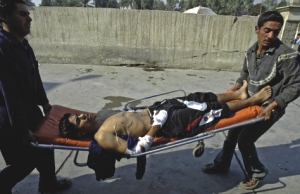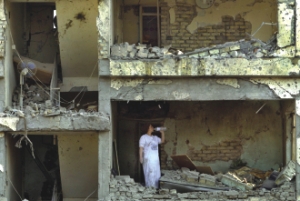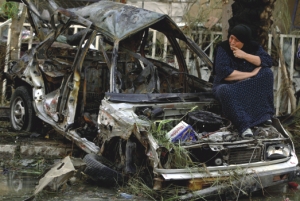Food For Thought
Ghost Stories for the 21st Century
Farah Ghuznavi
ALMOST two years after the US invasion of Iraq (let's call a spade a spade…), it is difficult to see how the occupation of that country has achieved anything positive - at least thus far. The daily reports of suicide bombers continues, alongside US-led initiatives against insurgents (described variously as a "ghostly", "invisible" or "intangible" enemy) and unnamed "leading terrorists". Interestingly, there is rarely substantial follow-up information to be had on such US offensives let alone any good news. Indeed, it now appears that chemical weapons were used in the bombing of Fallujah! And of course the litany of US military "accidents" resulting in civilian casualties (including a wedding party here or there…), continues to mount.
Undoubtedly, one of the most cynical and indefensible aspects of this occupation is the refusal of coalition forces to keep official records of the number of Iraqi civilian deaths - though it has recently been revealed by the UK Independent that US forces have  maintained a secret body-count in this regard. Why they should be so reluctant to make those figures public is inexplicable, unless one reads into it the worst possible motives i.e. an unwillingness to acknowledge the human cost of this so-called "liberation", and the refusal to dignify Iraqi deaths by keeping track of them in the same way that western casualties are recorded. maintained a secret body-count in this regard. Why they should be so reluctant to make those figures public is inexplicable, unless one reads into it the worst possible motives i.e. an unwillingness to acknowledge the human cost of this so-called "liberation", and the refusal to dignify Iraqi deaths by keeping track of them in the same way that western casualties are recorded.
The "liberation" of Iraq from the clutches of the admittedly loathsome Saddam Hussein was supposed to herald the beginning of a new era of democracy in the Middle East - an era of transparency and accountability in governance, in a country which had suffered for so long at the hands of a brutal dictator. Or so we were endlessly told.
However, even accepting that such positive changes do not take place overnight - particularly with regard to issues such as security and stability - the sordid handling of affairs in the post-Saddam administrations of Iraq leave a lot to be desired. And since it is an open secret where the real power in Iraq still lies, it is inevitable that the US administration will be judged for its performance in the handling of Iraq.
There has been a considerable amount of analysis around the military and security situation in Iraq, and a number of shortcomings have been identified in the management of the occupying forces. On the other hand, while there has been some reportage around the allegations of financial misappropriation involving Iraqi resources and various reconstruction contracts, rather less attention appears to have been given to such problems.
It is hard to fathom the reason for this. Perhaps it is because American contractors have been directly implicated in some of this fraud - or perhaps it is the fact that there are  close links between these US corporate interests and the current US government e.g. vice-president Cheney's well-known relationship with Halliburton, one of the organisations against which such allegations have been made. close links between these US corporate interests and the current US government e.g. vice-president Cheney's well-known relationship with Halliburton, one of the organisations against which such allegations have been made.
It was recently revealed that Iraqi national resources, including defence funds, have been plundered in the post-Saddam period. For example, according to the UK Independent, the sum missing over an eight-month period in 2004 and 2005 is the equivalent of the $1.8bn that Saddam allegedly received in kick-backs under the UN's oil-for-food programme between 1997 and 2003.
The UN was pilloried for not stopping this corruption, despite the fact that it is well-known that its hands are often tied by the decisions of its member countries, particularly those belonging to the Security Council - at least some of whom were aware of the actual situation! By contrast, the US military is vulnerable to greater criticism over the latest scandal because it was far better placed than the UN to monitor such corruption.
The untrained and meagrely-equipped Iraqi army can ill afford the loss of these funds, which are desperately needed to develop it into an effective security force. The Independent earlier revealed that the Iraqi army is so ill-equipped in the face of well-armed insurgents because its entire procurement budget of over $1 billion had been siphoned out of the country. Weapons were either never supplied or were discovered to be useless on delivery.
A senior corruption investigator in Baghdad stated that the Iraqi government was expected to issue a warrant for the arrest of Hazem al-Shaalan, the former Defence Minister, in connection with the disappearance of more than $1 billion. Radi al-Radhi, the head of Iraq's Commission on Public Integrity, said that between $1.3 billion and 2.3 billion was missing, adding: "What Shaalan and his ministry were responsible for is possibly the largest robbery in the world."
Mr Shaalan (the ex-Defence Minister), formerly a businessman in London, is now living in Jordan and denies any wrongdoing. He and other Iraqi officials say that everything they did during the eight months when the alleged thefts took place between June 2004 and February 2005 was with the knowledge of the US military and American civilian advisers attached to the ministry.
There are widespread allegations that the corruption actually started under the US-run Coalition Provisional Authority in 2003, when Iraqis with little experience were often appointed to senior positions in various ministries. A veteran Iraqi politician and current Member of Parliament, Mahmoud Othman, maintains that the Americans were partners of the Iraqis in the corruption that followed.
The scale of the corruption is evident in the report of the Independent which states that an additional $600-800 million is also missing from the ministries of transport, electricity, interior and other ministries. The sums involved in this plunder are all the more shocking given the relatively brief period within which the misappropriation has taken place.
Another senior Iraqi official stated that the interim government had spent $5.2 billion on the Ministries of Defence and Interior during six months, but there was little to show for it. He cited the case of more than $300 million spent on buying 24 military helicopters and other equipment from Poland, which, upon examination (of the helicopters), were found  to be 28 years old! To add insult to injury, the manufacturer had already recommended scrapping the helicopters after 25 years, so the Iraqis are now trying to recover their money... to be 28 years old! To add insult to injury, the manufacturer had already recommended scrapping the helicopters after 25 years, so the Iraqis are now trying to recover their money...
And the forms of corruption emerging are limitless! It appears that the Iraqi armed forces are full of "ghost battalions", in which officers pocket the pay of non-existent or long-absent soldiers. Dr. Othman mentions knowing at least one unit supposedly consisting of 2200 men, where the real figure was only 300! Therefore, he estimates that although the US talks about 150,000 Iraqis in the security forces, the real figure is closer to 40,000…
And the end result of it all is that poorly armed Iraqi army and police forces are completely unfit to replace American and British forces currently fighting anti-government insurgents. Not only does this have implications for coalition troop withdrawal plans - and the future stability of Iraq thereafter! - it makes a mockery of US claims about "liberating Iraq". So, the question that remains is: if Vietnam represents the ghost of "conflict past", and Iraq the ghost of "conflict present", what on earth should we expect as the ghost of "conflict future"?
Photos: AFP
Copyright (R) thedailystar.net 2005 |
